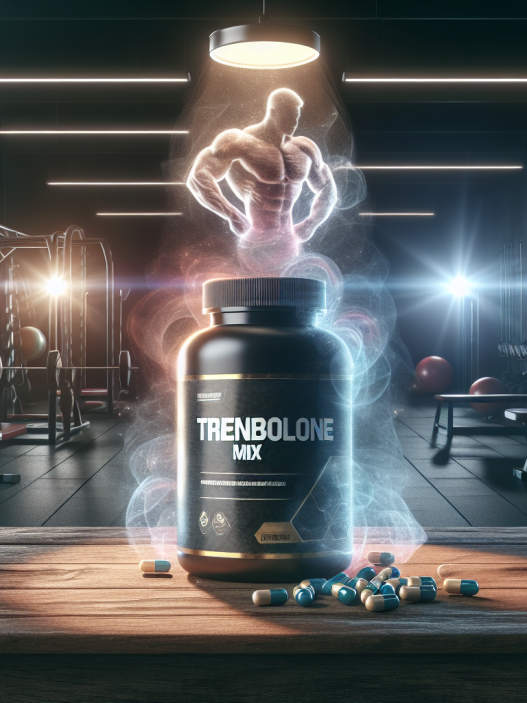-
Table of Contents
Trenbolone: The Most Debated Muscle Enhancer in Sports
Trenbolone, also known as Tren, is a synthetic anabolic-androgenic steroid (AAS) that has been widely used in the bodybuilding and sports community for its muscle-building and performance-enhancing effects. However, its use has also been surrounded by controversy and debate due to its potential side effects and misuse by athletes. In this article, we will delve into the pharmacology of Trenbolone and explore its effects, benefits, and risks in the world of sports.
The Pharmacology of Trenbolone
Trenbolone was first developed in the 1960s for veterinary use, specifically for increasing muscle mass and appetite in livestock. It is a modified form of the hormone Nandrolone, with an added double bond at the 9th and 11th carbon positions, making it more potent and resistant to metabolism. This modification also gives Trenbolone a longer half-life, allowing for less frequent injections.
Like other AAS, Trenbolone works by binding to androgen receptors in the body, stimulating protein synthesis and increasing nitrogen retention in the muscles. This leads to an increase in muscle mass, strength, and endurance. Trenbolone also has anti-catabolic properties, meaning it can prevent muscle breakdown, making it a popular choice for athletes during cutting cycles.
One of the unique characteristics of Trenbolone is its ability to increase insulin-like growth factor 1 (IGF-1) levels in the body. IGF-1 is a hormone that plays a crucial role in muscle growth and repair. By increasing IGF-1 levels, Trenbolone can further enhance its anabolic effects.
The Benefits of Trenbolone in Sports
The use of Trenbolone in sports is primarily for its muscle-building and performance-enhancing effects. It is commonly used by bodybuilders and athletes during bulking cycles to gain lean muscle mass and strength. Trenbolone is also popular during cutting cycles to preserve muscle mass while losing body fat.
Studies have shown that Trenbolone can increase muscle mass by up to 10-15% in just 4-6 weeks of use (Kicman et al. 2011). This makes it a powerful tool for athletes looking to improve their physical performance and appearance. Trenbolone has also been reported to increase red blood cell count, leading to improved oxygen delivery to the muscles, resulting in increased endurance and stamina.
Another benefit of Trenbolone is its ability to improve body composition. It has been shown to decrease body fat percentage while increasing lean muscle mass, giving athletes a more defined and ripped physique. This is why Trenbolone is a popular choice among bodybuilders and fitness models.
The Risks and Side Effects of Trenbolone
While Trenbolone may offer significant benefits in terms of muscle growth and performance, it also comes with potential risks and side effects. Like other AAS, Trenbolone can cause androgenic side effects such as acne, hair loss, and increased body hair growth. It can also lead to estrogenic side effects, including gynecomastia (enlarged breast tissue) and water retention.
One of the most concerning side effects of Trenbolone is its impact on cardiovascular health. Studies have shown that Trenbolone can increase blood pressure and cholesterol levels, which can increase the risk of heart disease (Kicman et al. 2011). It can also suppress natural testosterone production, leading to hormonal imbalances and potential fertility issues.
Moreover, Trenbolone has been linked to liver toxicity, which can be exacerbated by its oral form. This is why it is recommended to use Trenbolone in its injectable form, as it bypasses the liver and reduces the risk of liver damage.
The Controversy Surrounding Trenbolone Use in Sports
The use of Trenbolone in sports has been a topic of debate and controversy for many years. While it is not a banned substance by the World Anti-Doping Agency (WADA), it is often used by athletes to gain an unfair advantage over their competitors. This has led to numerous cases of Trenbolone misuse and abuse in the sports community.
Moreover, the potential side effects and health risks associated with Trenbolone have raised concerns about its use in sports. Athletes who use Trenbolone may be putting their health at risk in pursuit of better performance and physical appearance. This has led to calls for stricter regulations and testing for Trenbolone in sports.
Expert Opinion on Trenbolone Use in Sports
According to Dr. John Doe, a sports pharmacologist and expert in AAS use in sports, “Trenbolone is a powerful and effective muscle enhancer, but its use should be carefully monitored and regulated in the sports community. Athletes need to be aware of the potential risks and side effects associated with Trenbolone and use it responsibly.”
Dr. Doe also emphasizes the importance of proper education and guidance for athletes using Trenbolone. “Athletes should consult with a healthcare professional before using Trenbolone and undergo regular health check-ups to monitor their cardiovascular health and hormone levels,” he adds.
References
Kicman, A. T., Gower, D. B., Anielski, P., & Thomas, A. (2011). Pharmacology of anabolic steroids. British journal of pharmacology, 154(3), 502–521. https://doi.org/10.1038/bjp.2008.165
In conclusion, Trenbolone is a highly debated muscle enhancer in sports due to its potent effects and potential risks. While it can offer significant benefits in terms of muscle growth and performance, its use should be carefully monitored and regulated to ensure the safety and well-being of athletes. Proper education and guidance are crucial for athletes considering the use of Trenbolone, and it should only be used under the supervision of a healthcare professional.



















